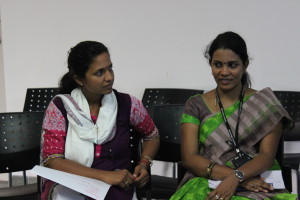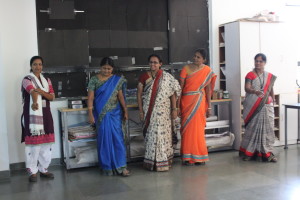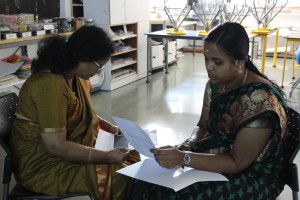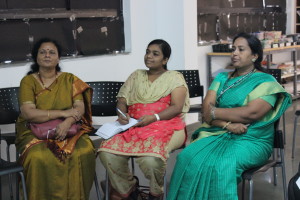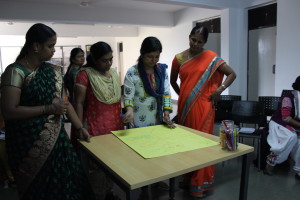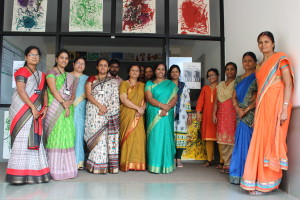Human rights are for everyone. It does not matter which social strata one belongs to, or the level of education. We began the workshop on human rights—to introduce the PeaceWorks Human Rights Defenders Module—for teachers at DPS Coimbatore with a round of introductions and a brief discussion on what the words human rights means to them. We then moved onto discussing where the participants in the workshop had seen these rights been violated.
Child labour said one participant. Begging said another. Denial of the right to education. Many of the participants said that they had often seen violation of rights in the case of women and children. One of the participants mentioned that very often we are guilty of seeing the term ‘rights’ as only in the case of the victim. What about the perpetrator? For instance in the case of capital punishment?
We then played a game called ‘ The Marchers and the Skipper’. Immediately likened to Kabaddi, this game involves a group of volunteers marching across a room and the skipper-who dances and skips around them. The marchers have to stop the skipper— and [figuratively] beat him/ her to the ground. The first few tries resulted in giggling, but once the marchers had a clearer idea of what they had to do, with the use of teamwork, they were able to beat down the skipper. A few other participants took the place of the skipper in turns and tried something different—doing their best to outwit the marchers.
In the discussion after the activity, the participants spoke about how the marchers were able to ‘oppress’ the skipper primarily through teamwork—which is a recurrent feature in almost every instance of oppression and exclusion. Discussing exclusion in the classroom, the participants spoke about how it is often triggered by what is happening at home—obvious differences between parents can affect the child—leading to behavioural changes and ultimately exclusion.
After the PowerPoint presentation on the module and a short break, we moved on to the section of the workshop titled ‘This was then and this is now’— the name of one of the sections in the module. Designed as a supplementary curriculum for schools by PeaceWorks, the module is based on the diary of Anne Frank and the Holocaust—guiding the discussion on Human Rights towards other Genocides that have occurred all over the world and finally onto issues of identity and the concept of difference. Activity based throughout, the module emphasises the use of art, literature and theatre.
We started this section with the screening of the trailer of ‘Don’t Think I’ve Forgotten: Cambodia’s Lost Rock and Roll’. This film, by American filmmaker John Pirozzi speaks about Cambodia before the Khmer Rouge and after the Genocide through the lens of rock and roll. Participants were then divided into groups of two and handed two readings–excerpts from Brigette Sion’s ‘ Conflicting Sites of Memory in Post- Genocide Cambodia’ and ‘Liberia’ by Ryan Lobo and asked to discuss the readings based on the concepts of forgiveness, moving on and survival. Each group was given paper in case they wanted to jot something down in the course of their discussion.
The session after this—sharing what each group had discussed with the other participants—proved to be intense and on very personal levels. One of the participants shared her own experience of being unable to forgive another country of being ‘responsible’ for the loss of her loved one. The incident that she shared was from when she was in the Middle East working as a teacher in a classroom with students from all over the world, including Afghanistan and Pakistan. She spoke about how in a class discussion about terrorism and loss, she made the deliberate decision to stay away from what was happening, allowing her students to handle the discussion. The loss and pain that she had experienced was simply too overwhelming. Noticing this, her student, who came from a war torn country told her —‘Ma’am, we too have lost loved ones’. This was a turning point in her life.
Another teacher shared her experience of growing up in Mumbai during the riots and seeing a shopkeeper, a mere acquaintance, burned alive had an impact on her. She also spoke about how children have an innate capacity to move on. Others agreed. Children can have arguments in class one day and become fast friends the next, all controversies having blown over. This however is not a permanent trait, fading as the child grows older. One of the participants asked ‘when is it that children start holding grudges?’
Who we are, our identity, is very much based on our experiences. Forgiveness, moving on and survival are all interconnected.
We then watched Hetain Patel’s TED talk on Identity. Patel is a London based artist who works on the issues of identity, authenticity and personal freedom. The TED talk describes the assumption we make particularly in the case of identity and multiculturalism. The participants enjoyed it, breaking into laughter and nodding in understanding at many of the points Patel makes. We ended with a brief exercise on identity—a stick figure drawn on a chart paper with ‘Me’ and ‘Society’ written on either side. The participants wrote a few words describing themselves—as they see themselves, and as society sees them.
–Paroma Sengupta
Learning to Live with Difference: A resource for teachers to engage with high school students in the understanding of human rights and inspiring them to become human rights defenders. This supplementary module serves as a starting point for teachers to build upon using current events and their own creativity.
If you wish to use the module in your school, write to us at peaceworks@seagullindia.com

